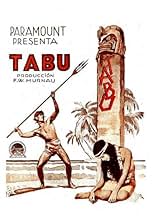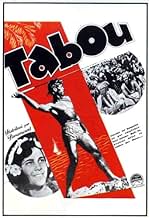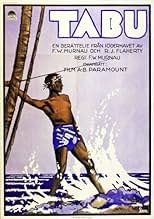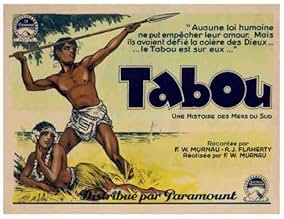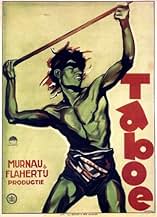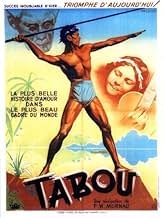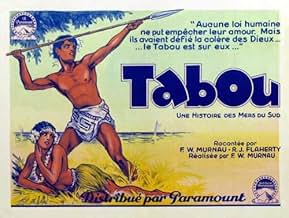Auf der Südsee-Insel Bora Bora droht der Liebe eines jungen Paares das Aus, als der Stammeschef das Mädchen zur göttlichen Jungfrau erklärt.Auf der Südsee-Insel Bora Bora droht der Liebe eines jungen Paares das Aus, als der Stammeschef das Mädchen zur göttlichen Jungfrau erklärt.Auf der Südsee-Insel Bora Bora droht der Liebe eines jungen Paares das Aus, als der Stammeschef das Mädchen zur göttlichen Jungfrau erklärt.
- Regie
- Drehbuch
- Hauptbesetzung
- 1 Oscar gewonnen
- 4 wins total
- The Girl
- (as Reri)
- The Policeman
- (as Jean)
- The Businessman
- (Nicht genannt)
- The Captain
- (Nicht genannt)
- Boys Friend
- (Nicht genannt)
Empfohlene Bewertungen
The best spear-fisherman on Bora Bora is a handsome young man billed simply as The Boy (Matahi). His legendary status and unparalleled skill makes him popular amongst the islanders, and soon he has caught the eye of The Girl (Reri - who went on to star on Broadway as Anne Chevalier). They romance each other, but their affair is soon halted by the arrival of emissary The Old Warrior (Hitu), who proclaims Reri as the sacred maiden. She is 'tabu', and cannot be looked upon by any man unless he wishes the punishment of death. The couple brave storm and sea to escape, an arrive in a French-colonised island, where Matahi start work as a pearl diver. But their happiness is fleeting, and Reri is soon haunted by the image of Hitu, terrified she may have angered the gods.
The plot is hardly anything new, but Floyd Crosby's Oscar-winning cinematography makes Tabu more socially aware that the film may have you believe. The subtle yet crucial involvement of the French colonists, finding amusement at Matahi's lack of understanding regarding money and material wealth, is a clear swipe at the creeping of Western civilisation. Bora Bora won't stay pure for much longer. And that adds a gravitas to Matahi and Reri's plight - not only is their romance doomed, but so are their traditions and society. It is one of the last great silent films, a reminder that sound can be an unnecessary distraction, and that picture's can sometimes genuinely speak louder than words.
www.the-wrath-of-blog.blogspot.com
The actors are real Polynesians and their ceremonies and rituals are faithfully captured, and interwoven with a tragic love story. The cinematography deservedly won an Oscar - it is truly beautiful. Murnau, away from his usual studio sets, manages to create the same sense of danger using natural light - especially moonlight - and real locations.
The performances are very strong - especially Chevalier as the girl, and the old man is as scary as Nosferatu as he haunts her dreams at night.
Sadly this was Murnau's last film - he died in a car crash just before the premiere. It is a little dramatically uneven, and certainly not the masterpiece that "Sunrise" is, but it is still very worthwhile.
The story is simple and direct. It's both a love story and a visual documentary that will appeal to Westerners accustomed to a more tech lifestyle. Parts of the narrative are conveyed by means of the writings in a ship captain's log. The writing is displayed on the screen, for viewers to read. The film's tone varies from light and cheerful at the beginning to more somber as the plot moves along.
Shot in Tahiti and Bora Bora, the film has a cast made up entirely of non-professionals. The B&W lighting is good, given the early era.
The film is one of the last of the silent period. And I'm therefore reluctant to find fault with it. The native Pacific music is really beautiful, what there is of it. I could have wished for a lot more. By contrast, the imported symphonic score is loud, nondescript, and intrusive. I guess that would be the one thing I would have changed.
Even for viewers who don't care for silent films, "Tabu: A Story Of The South Seas" might be appreciated for its documentary style visuals. For viewers familiar with silent cinema, this is a must-watch film, Director F.W. Murnau's last.
Wusstest du schon
- WissenswertesProducer/director/co-writer F.W. Murnau died in a car accident a few days after starting work on the music for this film. It had its New York premiere a week later.
- Zitate
The Girl: [writing a goodbye letter] I must go. Hitu is here and waits for me. You will die if I do not obey. I will go so that you may live. The tabu is upon us. I have been so happy with you far more than I deserved. The love you have given me, I will keep to the last beat of my heart. Across the great waters, I will come to you in your dreams when the moon spreads its path on the sea. Farewell.
- VerbindungenEdited into Treibjagd in der Südsee (1940)
Top-Auswahl
- How long is Tabu: A Story of the South Seas?Powered by Alexa
Details
Box Office
- Budget
- 150.000 $ (geschätzt)
- Laufzeit1 Stunde 26 Minuten
- Sound-Mix
Zu dieser Seite beitragen



